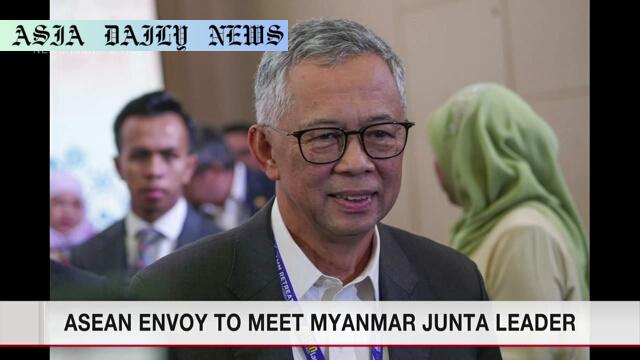Myanmar Junta: ASEAN envoy Othman Hashim to meet military leader Min Aung Hlaing in Naypyitaw, pushing for peace in the war-torn country.
- ASEAN envoy Othman Hashim to meet Myanmar’s military leader Min Aung Hlaing.
- A 5-point peace plan calls for halting violence and engaging democracy forces.
- Over 6,000 civilian deaths reported; true toll likely much higher.

The ASEAN Mission to Restore Peace in Myanmar
ASEAN’s newly appointed special envoy to Myanmar, Othman Hashim, has embarked on an urgent mission to mediate peace in the region. As the former secretary-general of Malaysia’s Foreign Ministry, Hashim brings years of diplomatic experience to his talks with the junta leader, Min Aung Hlaing. His key objective is the implementation of the Five-Point Consensus, a plan agreed upon in 2021, which aims to halt violence and engage all parties, including pro-democracy forces and ethnic minority groups.
Myanmar: Four Years of Turmoil Since the Coup
Myanmar has been plunged into crisis since the military ousted its elected government in February 2021. Following the coup, the country has witnessed violent clashes between the military and pro-democracy forces, coupled with escalating conflict involving ethnic minority groups. The consequences have been devastating, with more than 6,000 recorded civilian deaths, according to human rights organizations. However, activists argue that the true number could be significantly higher, especially when counting unverified deaths and military casualties.
Why the Five-Point Consensus Matters
The Five-Point Consensus, drafted shortly after the coup, represents ASEAN’s most concrete effort to mediate peace. The plan calls for an immediate cessation of violence, constructive dialogue between opposing factions, and the delivery of humanitarian aid. Importantly, it seeks to engage stakeholders such as pro-democracy forces and minority groups, while pressuring the military to take meaningful actions toward reconciliation. Despite being agreed upon by the junta, implementation has seen little progress, exacerbating frustration and skepticism from Myanmar’s citizens and international observers.
Othman Hashim: A Diplomatic Mission of Urgency
Othman Hashim is expected to press Min Aung Hlaing for measurable actions during their talks. Public statements suggest that Hashim’s approach will involve both direct confrontation and strategic diplomacy, urging the military leader to uphold prior commitments. Given his extensive credentials, observers hope that Hashim will succeed where previous envoys fell short. Regional experts emphasize the importance of dialogue with marginalized voices, including pro-democracy activists and ethnic groups, to ensure a comprehensive peace process.
International Response and the Pressure on ASEAN
The ongoing crisis in Myanmar has drawn widespread international condemnation. Several countries have imposed sanctions on the junta, while others have called for more robust ASEAN leadership. Critics argue that ASEAN’s inability to enforce the Five-Point Consensus undermines its reputation, both regionally and globally. However, Malaysia’s current leadership of the bloc, seen as progressive and proactive, could reinvigorate these peace efforts.
A Humanitarian Tragedy and the Road Ahead
The human costs of Myanmar’s prolonged conflict are staggering. Alongside the thousands of reported deaths, millions have been displaced, and the country’s infrastructure lies in ruin. Educational and healthcare systems have collapsed in many regions, leaving vast numbers of citizens without basic services. If unaddressed, this humanitarian crisis risks creating a generation without hope or opportunity.
Conclusion: A Path Forward?
While Othman Hashim’s visit to Naypyitaw marks a crucial moment for ASEAN diplomacy, it remains uncertain whether concrete outcomes will emerge. The stakes are exceedingly high, not only for Myanmar but also for ASEAN as it seeks to reaffirm its credibility. The international community will watch closely, hoping for a breakthrough that could finally set Myanmar on a path to peace.



Commentary
A Critical Test for ASEAN’s Credibility
Othman Hashim’s visit to Myanmar comes as ASEAN faces significant scrutiny over its ability to mediate meaningful political change. The Five-Point Consensus, intended as a roadmap to peace, has largely been ignored by the junta. This raises questions about ASEAN’s role as a regional leader and whether it can influence its member states to adhere to shared agreements. Hashim’s approach will need to strike a delicate balance between diplomacy and accountability.
The Need for Inclusive Dialogue
One of the most pressing challenges in Myanmar’s path to stabilization is the lack of inclusive dialogue. The exclusion of key pro-democracy groups and ethnic minorities from the negotiation table has hindered progress. Advocacy for these marginalized voices is essential if any outcome is to be sustainable. ASEAN must also seek creative solutions to include these groups without antagonizing the junta further, a challenge that will test the bloc’s diplomatic acumen.
High Stakes for ASEAN and Myanmar
The current crisis represents a pivotal moment for both Myanmar and ASEAN. Failing to act decisively risks prolonging the country’s suffering while eroding trust in ASEAN’s ability to lead. Positive outcomes from Hashim’s mission could set a precedent for how regional organizations address internal conflicts within member states. However, the complexity of the situation leaves no room for superficial solutions, demanding a concerted and well-coordinated effort by all stakeholders.